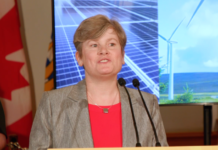EXTREMELY cold temperatures across B.C. drove peak hourly electricity demand – the hour customers use the most electricity – to a record high level on Friday night when it reached 11,300 megawatts, BC Hydro said on Sunday.
Despite the record-breaking demand, B.C. did not require imports from the market and also had enough generating capacity to provide support to its neighbours in Alberta and the Pacific Northwest who were experiencing demand and system challenges. This includes about 200 megawatts exported to Alberta following an electrical grid alert from the Alberta Electrical Systems Operator.
“Extreme weather events like drought and cold snaps are putting people and communities at increased risk,” said Josie Osborne, Minister of Energy, Mines and Low Carbon Innovation. “Thanks to the resiliency of our energy system and exceptional planning by BC Hydro, we are able to meet the needs of British Columbians while also delivering clean, reliable hydro-electricity to our neighbours in Alberta when they needed it most.”
Before the new record was set on Friday night, the previous record was 10,977 megawatts set in December 2022. Friday night’s consumption was more than 30 per cent higher than the previous Friday night before the cold snap began, and Saturday night’s peak hourly load remained high at nearly 11,000 megawatts.
“B.C. is fortunate to have an integrated, provincial hydroelectric system that allows BC Hydro to ramp up quickly when generation is needed and scale back when it is not,” said Chris O’Riley, President and CEO, BC Hydro. “Our teams carefully plan and prepare for cold weather events like this to ensure our generating facilities are running at full capacity so we can deliver clean electricity to our customers when they need it the most.”
Though the historic drought has impacted some of BC Hydro’s largest reservoirs – the source of water for the clean power it generates – in the north and southeast of the province, its team has been planning in real-time for over a year to manage these conditions. As a hydroelectric-based utility, the variability of water conditions and its impact on its reservoir levels is something that BC Hydro deals with every year.
BC Hydro said it has the tools to manage these conditions, including multi-year storage in its reservoirs, regional diversity in its generating facilities, contracts for power, and the ability to import and export power through the Western Interconnection – a network of high-voltage transmission lines that connects B.C. with other utilities in western North America.
With the cold snap expected to last a couple more days, demand will remain higher-than-average, but it will not be at record-breaking levels.
For more information on how to save electricity and money this winter, visit bchydro.com.













